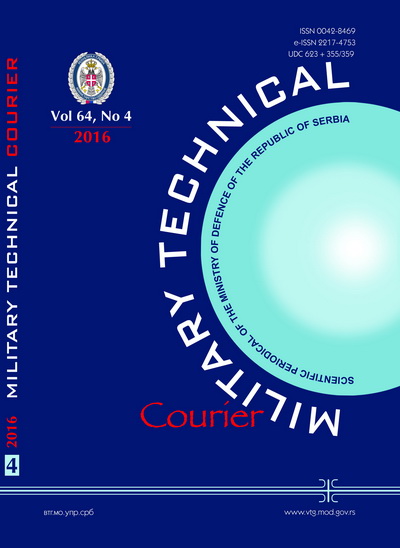Monitoring the effect of motivation on mastering knowledge and skills in distance learning systems
Abstract
This paper describes how motivational processes affect students from the point of view of acquiring knowledge and skills, transfering them and using them in distance learning systems. Research in the social-cognitive framework illustrates the flexibility of the system and adequate adjustment of motivational patterns. A model of motivational processes, based on research, is presented as a function of learning objectives.The didactic-methodical approach to teaching was changed and adapted parallelly with monitoring the impact of the motivational factor on cognitive task performance and on students’ responses, i.e. with the motivational factor influence on the success or failure of the cognitive outcome and the learning process quality. This work investigated the influence of specific knowledge areas and the interests of students on understanding professional or scientific lectures. The implications in practice and interventions done through the design of software of distance learning systems were aimed at correcting the educational process.Two forms of prior knowledge (expert knowledge and general thematic knowledge) were checked at the start as entrance tests and a preparatory course. After problem solving, a feedback analysis was carried out to determine the effects of prior professional knowledge, general thematic knowledge and interests on understanding and solving problems. The analysis of the results showed that for solving professional and technical tasks, prior knowledge of the domain, general thematic knowledge and interests were significant predictors of understanding and success.
References
Boyer, K.E., Phillips, R., Wallis, D.M., Vouk, A.M., & Lester, C.J. 2008. Balancing Cognitive and Motivational Scaffolding in Tutorial Dialogue. . In: B. Woolf& et al. Ur., ITS 2008, LNCS 5091. Berlin, Heidelberg: Springer-Verlag., pp.239-249.
Boyer, K.E., Phillips, R., Wallis, D.M., Vouk, A.M., & Lester, C.J. 2009. Investigating the Role of Student Motivation in Computer Science Education through One-on-One Tutoring. Computer Science Education, iss. Author's preprint version, 19(2), pp.111-136.
Ezen-Can, A., & Boyer, K.E. 2015. A Tutorial Dialogue System for Real-Time Evaluation of Unsupervised Dialogue Act Classifiers: Exploring System Outcomes. Artificial Intelligence in Education,, 9112 of the series Lecture Notes in Computer Science, pp.105-114. doi:10.1007/978-3-319-19773-9_11.
Grafsgaard, F.J., Wiggins, B.J., Boyer, K.E., Wiebe, N.E., & Lester, C.J. 2013. Automatically Recognizing Facial Indicators of Frustration: A Learning-Centric Analysis. . In: Humaine Association Conference on Affective Computing and Intelligent Interaction, Geneva, Switzerland. IEEE Computer Society Conference Publishing Services, CPS., pp.159-165. doi:10.1109/ACII.2013.33.
Grimley, M., & Riding, R. 2009. Individual Differences and Web-Based Learning, Cognitive and emotional processes in web-based education: Integrating human factors and personalization. U C. Mourlas, N. Tsianos, & P. Germanakos Ur., .Pennsylvania, USA: IGI Global., pp.1-24. Chapter 1.
Lawrence, H.V., & Wiswell, A.K. 1995. Feedback in a two-way street. Training & Development, 49.
Lepper, M.R., Woolverton, M., Mumme, D.L., & Gurtner, J. 1993. Motivational techniques of expert human tutors: Lessons for the design of computer-based tutors. U S.P. Lajoie& S.J. Derry Ur., Computers as Cognitive Tools.Hillsdale: Lawrence Erlbaum Associates, Inc.., pp.75-105.
Lungulov, B. 2010.Motivacija učenika u nastavi - pretpostavka uspeha u učenju. Pedagoška stvarnost, Univerzitet u Novom Sadu, Filozofski fakultet, 56(3-4), pp.294-305.
Маrić, М.,& Sаkаč, М., 2014, Individual and social factors related to students’ academic achievement and motivation for learning. Suvremena Psihologija, 17(1), pp.63-79.
Perlovsky, L. 2007. Modeling Field Theory of Higher Cognitive Functions. Air Force Research Center.USA: Idea Group Inc..
Punie, Y., Cabrera, M., Bogdanowicz, M., Zinnbauer, D., & Navajas, E. 2006.The Future of ICT and Learning in the Knowledge Society. . In: Report on a Joint DG JRC-DG EAC Workshop held, 2005, Seville: European Commission - Joint Research Centre - Institute for Prospective Technological Studies. EUR 22218EN (Technical Report No.EUR 22218 EN).
Rebolledo-Mendez, G., Boulay, B., & Luckin, R. 2006. Motivating the learner: An empirical evaluation. . In: Proceedings of the 8th International Conference on Intelligent Tutoring Systems, Jhongli, Taiwan, pp.545-554.
Rus, V., D'Mallo, S., Xiangen, H., & Graesser, A.C. 2013. Recent Advances in Conversational Intelligent Tutoring Systems. AI Magazine, pp.42-54.
Tan, J., & Biswas, G. 2006. The role of feedback in preparation for future learning: A case study in learning by teaching environments. . In: Proceedings of the 8th International Conference on Intelligent Tutoring Systems, Jhongli, Taiwan, pp.370-381.
Proposed Creative Commons Copyright Notices
Proposed Policy for Military Technical Courier (Journals That Offer Open Access)
Authors who publish with this journal agree to the following terms:
Authors retain copyright and grant the journal right of first publication with the work simultaneously licensed under a Creative Commons Attribution License that allows others to share the work with an acknowledgement of the work's authorship and initial publication in this journal.
- Authors are able to enter into separate, additional contractual arrangements for the non-exclusive distribution of the journal's published version of the work (e.g., post it to an institutional repository or publish it in a book), with an acknowledgement of its initial publication in this journal.
- Authors are permitted and encouraged to post their work online (e.g., in institutional repositories or on their website) prior to and during the submission process, as it can lead to productive exchanges, as well as earlier and greater citation of published work (See The Effect of Open Access).

